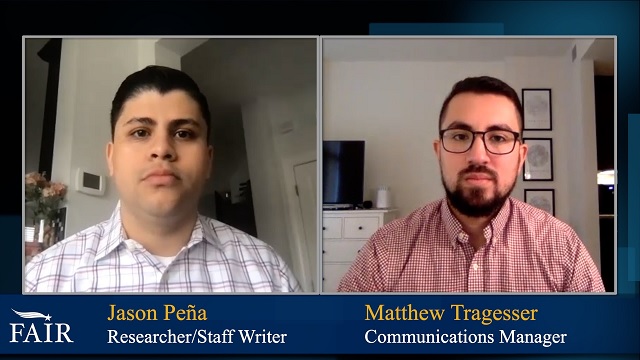Congress Passes Funding Package, Leaves for Recess and Fails to Secure Border

Early Saturday morning, Congress passed a spending bill to fully fund the government through Fiscal Year (FY) 2024, which ends September 30. In both the Senate and House of Representatives, the bill garnered more Democratic than Republican votes. In the Republican-controlled House, the bill failed to gain a majority of Republican support, but passed by a vote of 286-134. The final vote in the in the Senate was 74-24.
The new appropriations bill provides $1.2 trillion in funding for multiple departments within the government. These include the Department of Homeland Security (DHS), Department of Health and Human Services (HHS), and State Department, all of which are responsible for implementing our immigration laws. Unfortunately, while the bill gives money to these departments, it does not mandate policy changes that would secure our borders and enforce our immigration laws. In fact, it reinforces Biden Administration policies allowing the mass processing and release of illegal aliens into the country.
Supporters of the bill will point out that it includes funding for 22,000 Border Patrol agents and 41,500 detention beds, an increase from 34,000. However, without policy changes, the Border Patrol agents will likely be used to process and release illegal migrants and the detention beds will remain unused. Indeed, that outcome is almost guaranteed as the bill does nothing to end the administration’s catch-and-release policies, build the border wall, or stop the abuse of asylum and parole laws. This means business as usual at the border.
Subsidizing Illegal Immigration
Instead of deterring illegal immigration, some of the largest line items in the bill effectively subsidize it. The appropriations bill provides $3.9 billion to the State Department to support foreign countries with migration and refugee assistance. The bill further provides funds to Latin American and Caribbean countries for economic assistance and to address “irregular migration,” consistent with the radical Los Angeles Declaration to “promot[e] principles of safe, orderly, humane, and regular migration.” The bill provides money to support development in El Salvador, Guatemala, and Honduras and includes a broad-based exemption for funds going to humanitarian assistance from requirements to combat corruption, human rights abuses and drug trafficking. That exemption goes so far as explicitly noting that receiving State Department funds does not require “demonstrable actions to secure national borders and stem mass migration.”
Other funding in the bill subsidizes illegal aliens once they are in the country. The bill allocates $650 million to the Shelter and Services Program (SSP), operated by the Federal Emergency Management Agency (FEMA), to provide grants to NGOs and sanctuary jurisdictions which facilitate illegal immigration. Another $117 million is provided to the Emergency Food and Shelter Program (EFSP) within FEMA, which in the past has been abused to provide the same type of grants for shelter and services for illegal aliens.
The appropriations bill also provides $470 million to Immigration and Customs Enforcement (ICE) for the Alternatives to Detention (ATD) program. Under the Biden Administration, ATD has been used to allow illegal aliens to check in via a mobile application rather than be subject to GPS monitoring. The Biden Administration and its “abolish ICE” allies have been working to eliminate detention altogether and instead rely on ATD to allow illegal aliens to freely move about the United States.
Expanding Legal Immigration
In addition to appropriating money, the funding bill expands two visa programs: the H-2B program and the Special Immigrant Visa program for Afghan nationals.
H-2B Program Expansion. The appropriations bill authorizes Secretary Mayorkas to increase the number of H-2B visas available in FY2025 beyond the 66,000 statutory cap. It does so by allowing the Secretary to include thousands of workers who have participated in the program in the past, also known as “returning workers,” without counting those workers against the cap. Last year, Mayorkas used a similar exemption to increase the number of H-2B workers by 64,716 – nearly doubling what Congress intended – making a total of 130,716 visas available in FY2024. Additionally, the bill changes how wages for H-2B workers are determined, allowing employers to not only use private wage surveys but also to base the prevailing wage on the geographic area (rather than the national survey data, which is generally higher).
SIVs for Afghan Nationals. The bill likewise increases the total number of special immigrant visas (SIVs) for Afghan nationals without improving the vetting process. It makes an additional 12,000 SIVs available for Afghans in FY2025 – plus family members who do not count against the cap – despite the fact that the United States has had no presence in Afghanistan since 2021 and the program is slated to expire in December 2024. Many of the Afghans seeking SIVs were illegally paroled into the U.S. without proper vetting after the fall of Kabul in August 2021. Adding to the security risk, in 2022, the State Department and DHS took the extraordinary step of waiving certain terrorism-related inadmissibility grounds under INA 212(a)(3)(B) for Afghan nationals, which may apply to SIV applicants.
Additional Provisions
Unaccompanied Alien Children. The bill makes no policy changes to prevent unaccompanied alien children (UACs) from being trafficked or released to unvetted sponsors. The bill provides $5.4 billion in funding for the Office of Refugee Resettlement (ORR) to process UACs and to maintain an average of 16,000 beds for UACs in their care. It also provides additional funding that is triggered if the level of children needing housing surpasses the bed space provided. The bill, however, does nothing to force the agency to better screen sponsors or increase well-being checks after minors are released to sponsors. To the contrary, it handcuffs the government from going after sponsors by expressly prohibiting ICE from using information it may obtain on an alien sponsor for enforcement action, unless that sponsor has a charge or felony conviction for certain serious crimes.
Earmarks. Finally, the appropriations bill contains more than a hundred pages of earmarks, amounting to billions for pet projects. These earmarks allow Members of Congress to request federal funds to be allocated for specific projects in their home districts. For example, Senators Chuck Schumer and Kirsten Gillibrand (D-N.Y.) were successful in including $500,000 for an immigrant workforce development program; Senator Tammy Baldwin (D-Wis.) was able to secure $450,000 for childcare programs specifically for immigrant families; and, in Colorado, Democratic Senators Michael Bennet and John Hickenlooper got $93,000 for the International Rescue Committee to provide services to immigrants and refugees.
Other harmful provisions in the appropriations bill include:
- $160 million in taxpayer funds for U.S. Citizenship and Immigration Services (USCIS), which is typically funded by fees and those seeking benefits, to process asylum applications and work authorizations;
- $97 million for migrant and seasonal farmworker programs instead of supporting American jobs;
- $15 million for the Case Management Pilot Program (CMPP) to provide welfare benefits and aid illegal aliens facing deportation;
- $10 million for the Citizenship and Integration Grant program, which has been routinely awarded to organizations involved in active litigation against DHS; and
- 2-year funding for the Office of Detention Ombudsman.
Conclusion
Even after the bill was passed, lawmakers continued to debate its value. House Speaker Mike Johnson (R-La.) commended passage of the appropriations bill but also promised “a series of meaningful bills” to address the border crisis in the coming weeks. Congresswoman Marjorie Taylor Greene (R-Ga.) meanwhile took the first steps to remove him as Speaker, with House Freedom Caucus (HFC) Chair Bob Good (R-Va.) saying, “Frankly, I can’t defend the speaker.” Senate Majority Leader Chuck Schumer praised the bill’s passage, claiming that “It is good for the country that we have reached this bipartisan deal.”
Many Republicans are no doubt frustrated because Congress has had multiple opportunities to step in and end the Biden Border Crisis and has failed to act. Nearly a year ago, the House passed the FAIR-supported H.R. 2, the Secure the Border Act, but the Senate has refused to take it up. In addition, Congress has now passed FY2024 funding, four short-term spending bills (continuing resolutions), and considered a foreign aid package, all without including any of the critical policy changes from H.R. 2. Now, Congress is providing funding to the agencies responsible for enforcing our immigration laws without ending the policies have that created the worst border crisis in history.
Under the Biden Administration, Americans across the country are forced to face the consequences of its disastrous border policies in their communities and daily lives. Rather than taking a stand and fighting for border security, however, Congress opted for the status quo. Funding alone won’t solve the Biden Administration’s border crisis, and neither will weak bills that reinforce this administration’s open-borders agenda. In the coming weeks and months, FAIR will continue to advocate for meaningful steps to secure our borders and enforce our immigration laws. It is far past time for Congress to act.
To learn more about H.R. 2, the Secure the Border Act, and how you can get involved, visit FAIR’s activist toolkit here. To read more about actions that Biden can take to secure our borders today, click here.
AUTHOR
Joe Chatham joined FAIR in 2022, bringing significant congressional, campaign, and nonprofit experience to the organization. As part of FAIR’s influential government relations team, he helps manage Capitol Hill outreach and policy, advocating for a secure border and a just, equitable legal immigration system.
Before joining FAIR, Joe worked with a large range of organizations, from congressional offices and political campaigns, to intergovernmental organizations and think tanks. Most recently, he served as counsel to a member of congress, where he handled the representative’s immigration portfolio for the House Committee on the Judiciary.
He holds a Bachelor of Arts from the University of Michigan, a Master in Public Administration from the Harvard Kennedy School, and a Juris Doctor from Yale Law School.
RELATED ARTICLES:
Illegal Immigrants Burst through Border Barricade as Crisis Continues
EDITORS NOTE: This FAIR Take column is republished with permission. © COPYRIGHT 2024 FEDERATION FOR AMERICAN IMMIGRATION REFORM, ALL RIGHTS RESERVED






